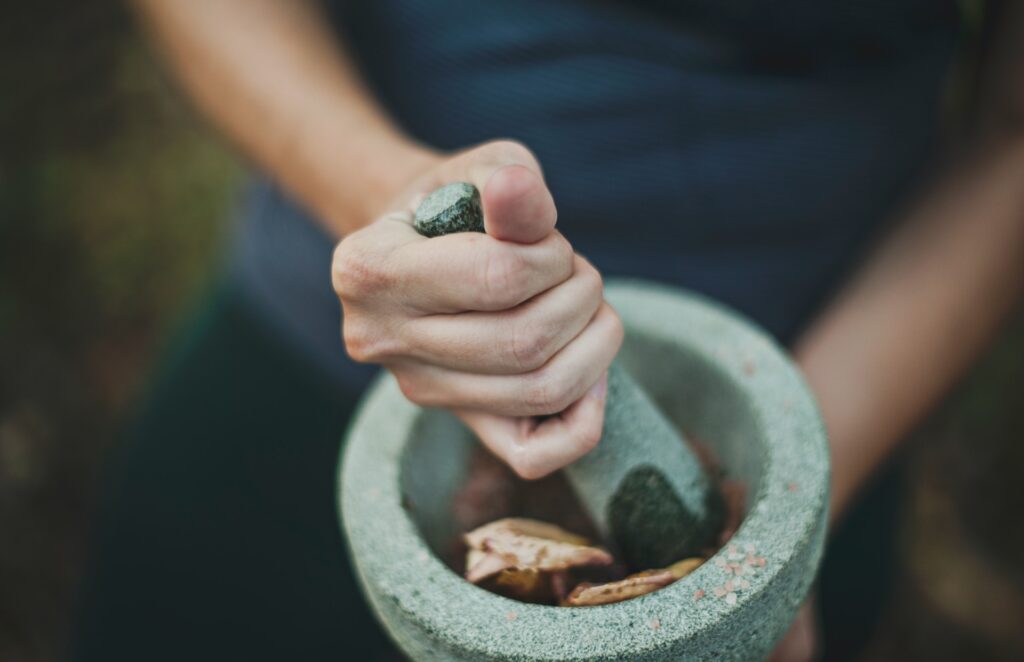We can all agree that UTIs are the absolute worst. The burning sensation, the constant urge to pee, and the discomfort all around make it hard to function normally. As someone who’s dealt with UTIs, I know firsthand the importance of finding the right treatment. And believe it or not, herbs for UTI treatment might just be the natural solution you’ve been searching for.
These powerful plants have been used for centuries for their medicinal qualities and can offer many benefits beyond traditional antibiotics. So let’s dive into the world of herbal remedies and explore what nature offers for UTI relief.
Overview of Urinary Tract Infections

Urinary tract infections are an infection that occurs in any part of your urinary system, which includes your bladder, kidneys, urethra, and even your ureters. The urinary system removes waste and excess fluids from your body. A UTI occurs when bacteria, fungi, or viruses enter your urinary system and multiply in your bladder, causing an infection. The most common type of UTI is a bladder infection when uti causing bacteria travel up your urethra and enter your bladder.
So, why do UTIs happen? Several factors can increase the risk of UTIs, including:
- Sexual Activity: Sexual intercourse can cause bacteria from the genital area to enter the urinary tract.
- Poor Hygiene: If you don’t wipe from front to back after using the bathroom, it can bring bacteria into the urethra.
- Urinary Tract Abnormalities: Any birth defects or anatomical abnormalities can affect the flow of urine and cause infections in the urinary tract.
- Menopause: Decreased estrogen levels can lead to changes in the urinary tract, increasing the risk of UTIs.
- Catheter Use: Urinary catheters can introduce bacteria into the urinary tract and increase the risk of infection.
The symptoms of UTIs can vary, but the most common ones include:
- Frequent and urgent need to pee
- Pain or burning during urination
- Cloudy or strong-smelling urine
- Pain or pressure in the lower abdomen or back
- Fatigue or fever (if the infection has spread to the kidneys)
If you experience any of these symptoms, seeing a healthcare provider is important. UTIs can be diagnosed with a simple urine test and treated with antibiotics. UTIs can lead to serious complications such as kidney damage or sepsis if left untreated.
Herbs for UTI Treatment

Though antibiotics are the most common treatment, certain herbs for UTI treatment can relieve symptoms and help fight off the infection. Here are a few of the top herbal medicine for UTIs:
Disclaimer: It’s important to note that these herbs for UTI treatment should not be used in place of professional medical advice. Always consult your healthcare provider before using any herbs, as some may interfere with certain medications or have side effects.
Garlic

Garlic has been used for centuries as a natural antibiotic in various cultures, predominantly for its incredible antimicrobial properties. Allicin, the active compound present in Garlic, has antibacterial, antifungal, and antiviral properties that prevent the growth and multiplication of bacteria responsible for urinary tract diseases. Hence, Garlic can be an effective alternative in treating UTIs naturally. Incorporating Garlic into your diet can help to strengthen your immunity, fight oxidative stress, and reduce inflammation.
Using Garlic for UTI Treatment
Adding fresh Garlic cloves to your meals can be helpful. You can also try garlic supplements in the form of garlic oil or tablets, as they are readily available in the market. But, if you prefer natural remedies, chew two to three fresh Garlic cloves on an empty stomach daily. It might seem like a lot at first, but trust me; your body will thank you.
Garlic Tea
Other than consuming Garlic, another way of using it for UTIs is by making Garlic tea. It is an easy and less intense way of using Garlic for your UTI treatment. You only need two to three fresh Garlic cloves, a cup of water, and honey to sweeten it. Boil the Garlic cloves for ten minutes and then strain the mixture. Adding two teaspoons of honey, consume the mixture before going to bed. It is an effective UTI remedy and helps treat colds and sore throats.
Garlic Supplements
If you don’t like Garlic’s taste or smell, then plenty of Garlic supplements are available in the market. It is best to consult your doctor before taking any supplement, as it might have side effects or interact with other medications.
Uva Ursi

Uva Ursi, scientifically known as Arctostaphylos uva-ursi, is a low-growing evergreen shrub that belongs to the heather family. The plant is native to North America, Europe, and Asia. Uva Ursi leaves have been used for centuries in traditional medicine for their anti-inflammatory, astringent, and antibacterial properties.
Uva Ursi contains several active compounds such as hydroquinone, arbutin, tannins, and flavonoids, making it an effective herb against UTI. Hydroquinone and arbutin are converted to a compound called hydroxyquinoline, which has strong antibacterial properties. Tannins help to reduce inflammation and have astringent properties that soothe and tighten the tissues in the urinary tract.
Using Uva Ursi for UTI treatment
Uva Ursi is available in different forms, including capsules, tablets, tinctures, and tea. It is essential to consult a healthcare provider before using any form of Uva Ursi. The recommended dosage of Uva Ursi varies depending on the form and strength of the product. For instance, capsules and tablets typically contain 200 to 1,200mg of Uva Ursi, while tinctures may contain up to 40% of the herb. You can make uva Ursi tea by steeping 1 to 2 teaspoons of dried herb in hot water for about 10 to 15 minutes. Drinking plenty of water while using Uva Ursi is advisable to flush out the toxins from the urinary tract.
The Benefits of Using Uva Ursi
Uva Ursi is a natural and effective remedy for UTI, as it helps to reduce inflammation, kill harmful bacteria, and promote healing. Uva Ursi is also believed to have diuretic properties, which help to flush out the urinary system and prevent the accumulation of bacteria. Additionally, Uva Ursi has antiseptic properties that can help prevent UTI recurrence.
While Uva Ursi is safe for most people to take, you should not use it for long-term use or by people with kidney or liver disease or pregnant women. Like any plant, it must be used under professional care and advice.
Goldenseal

Goldenseal is a herb used for decades as a natural remedy for many ailments, including bladder infections. Its antiseptic properties make it the perfect alternative to synthetic antibiotics, which can have nasty side effects. Moreover, Goldenseal contains a compound called berberine, which has powerful antimicrobial properties that can effectively kill off bacterial infections. Berberine is known to help reduce inflammation and boost the immune system, making it an ideal herbal treatment for UTIs.
Using Goldenseal for UTI Treatment
Goldenseal root is usually taken in pill or capsule form and can also be used topically, with the root being made into a paste. If you are taking Goldenseal orally, it is recommended to take it with food to avoid gastrointestinal problems. It is also worth noting that this herb’s potential side effects can be amplified if used in conjunction with other supplements or medication. Thus, checking with your healthcare provider before taking it is advisable.
Goldenseal is not only helpful in treating UTIs, but it can also serve as a preventative supplement. Since UTIs are caused by bacteria, taking Goldenseal supplements can help reduce the number of bacteria in your body. If you experience recurrent UTIs, taking Goldenseal regularly may be helpful.
Side Effects
Bear in mind that with all herbal treatments, Goldenseal’s potency and effectiveness depend on the quality of the supplement and the body’s receptive response. Moreover, since Goldenseal contains active compounds, taking too much of it can cause unpleasant side effects, including digestive issues and liver damage. Therefore, it is essential to follow dosage recommendations and seek professional advice.
Parsley

Parsley contains flavonoids, volatile oils, and various vitamins and minerals, all of which have antibacterial, anti-inflammatory, and diuretic properties that help to fight the underlying causes of UTIs. These properties work together to increase urine flow while also fighting the bacteria that cause UTIs, reducing inflammation in the urinary tract, and relieving discomfort.
Moreover, parsley also contains APIsmin, which helps regulate the menstrual cycle and provides relief from cramps, which can also cause UTIs. It also contains vitamin C, which strengthens the immune system and helps the body fight off infections.
Using Parsley for UTI Treatment
When preparing parsley as a UTI treatment, you have several options. You can either consume parsley leaves directly or mix them with other ingredients to make parsley tea. To make this tea:
- Boil one cup of water for every half cup of freshly chopped parsley.
- Simply pour the boiling water over the chopped parsley and steep it for about five minutes.
- Strain the tea and drink it slowly while it’s still hot. You can also add honey or lemon juice to improve the flavor, but avoid using sugar since it can increase inflammation.
If you don’t like the taste of parsley tea, you can also add parsley to your meals. Chopping up fresh parsley and including it in salads or using it as a garnish for your various dishes is a delicious way to get its benefits. Furthermore, you can also use parsley capsules or extracts if the taste of parsley is not something you enjoy.
Dandelion

Dandelion, scientifically known as Taraxacum officinale, has been a natural remedy for centuries. It offers various health benefits and is particularly useful in treating UTIs. Dandelion has diuretic properties, which promote increased urination and help flush out harmful bacteria from the urinary tract. Frequent urination helps prevent the proliferation of bacteria and decreases the risk of UTI recurrence. Moreover, dandelion is an herb that boasts anti-inflammatory properties, which help soothe the inflamed tissues in the bladder, reducing pain and discomfort.
Aside from being a diuretic and anti-inflammatory, dandelion is also rich in antioxidants, which help boost the body’s immune system. Antioxidants fight off the free radicals in the body, UTI causing oxidative stress that can cause cellular damage. Boosting the immune system is essential for preventing UTIs, as a weak immune system makes the body vulnerable to bacterial infections.
Using Dandelion for UTI Treatment
In order to use dandelion as a remedy for UTI, you can either drink it as tea or take it as an herbal supplement. You can consume dandelions in the form of dried leaves, roots, or flowers. Speaking to your healthcare provider before starting any medication, including herbal supplements, is essential. They can advise you on the proper dosage and other relevant factors.
Juniper Berry

The Juniper berry is a small, bluish-purple fruit from a coniferous tree. Juniper berries have been used for centuries in traditional medicine for various ailments, including UTIs. Juniper berries are known for their antiseptic, diuretic, and antimicrobial properties, which make them an effective treatment for UTIs.
These berries contain compounds that help to cleanse the urinary tract and bladder. These compounds increase urine flow, which helps flush out bacteria and other harmful substances that can cause UTIs. Additionally, juniper berries have antimicrobial properties that can help to kill bacteria that may be causing the infection.
Using Juniper Berries for UTI Treatment
Juniper berries can be consumed in several forms, including capsules, tea, and tincture. If you’re using juniper berry capsules or tincture, follow the recommended dosage on the label. For tea, add a teaspoon of crushed juniper berries to a cup of hot water and let steep for 10-15 minutes. You can drink up to three cups per day. It’s important to note that you should only use juniper berries for short periods.
Though these berries have a lot of benefits, they should not be used by pregnant women, individuals with kidney disease, or those taking certain medications. Additionally, juniper berries should not be used in large doses, as they can cause kidney irritation and damage.
Boxwood

Boxwood (Buxus sempervirens) has been used for centuries for various medicinal purposes, including UTI treatment. It has antiseptic, antimicrobial, and anti-inflammatory properties making it an effective natural treatment for UTIs. Boxwood is an evergreen shrub native to Europe, Asia, North Africa, and the Mediterranean. Its leaves and bark contain alkaloids, flavonoids, and essential oils, which contribute to its healing properties.
Boxwood can kill bacteria in the urinary tract. The plant’s essential oil has been shown to have a bactericidal effect on Gram-positive and Gram-negative bacteria present in UTIs. These essential oils include buxine and cyclobutane, which work to prevent the growth and spread of these harmful bacteria. Boxwood has also been shown to help reduce inflammation in the urinary tract, which can alleviate symptoms such as burning and pain associated with UTIs.
Using Boxwood for UTI Treatment
Boxwood can be taken in different forms to treat UTIs. One of the most common ways is tea made from dried Boxwood leaves. To make the tea, you must steep a teaspoon of dried Boxwood leaves in a cup of boiling water for 10-15 minutes. Drink this tea two to three times a day until symptoms subside. Alternatively, you can take liquid extracts of Boxwood that you can add to water or take directly. The recommended dosage is 500-1000 mg per day.
However, like any other herbal remedy, overconsumption of Boxwood may cause unwanted side effects. Some adverse effects of Boxwood include nausea, vomiting, and diarrhea. Therefore, following the correct dosage when taking Boxwood for UTI treatment is best.
Cranberry

Cranberry is a type of evergreen shrub that is native to North America. The fruit of this plant is packed with antioxidants that help to protect against inflammation and oxidative stress. Research has shown that consuming cranberry products or supplements can prevent bacteria from adhering to the urinary tract walls, making it easier for the body to flush out harmful bacteria that cause UTIs.
One of the benefits of using cranberry is that it’s a natural antibiotic, so it won’t destroy the good bacteria in your gut like traditional antibiotics can. In fact, cranberry has been found to work against various bacteria strains that cause UTIs, including E. coli, a common culprit. When taken regularly, cranberry can also help to prevent UTIs from occurring in the first place.
Using Cranberry for UTI Treatment
There are several ways to incorporate cranberry into your diet. Drinking cranberry juice is a popular option, but choosing a juice low in sugar and not made from concentrate is essential. Another option is to take a cranberry supplement, which ensures you’re consuming the appropriate dose of cranberry without the added sugar or calories. Cranberry supplements come in various forms, such as capsules, gummies, or even powder. Whichever way you choose, it’s important to follow the recommended dose to ensure you achieve the desired effects.
Acerola

Acerola, also known as Barbados Cherry, is a tropical fruit that’s found in Central and South America. The fruit is best known for being one of the richest sources of Vitamin C. But that’s not all there is to Acerola. Apart from being a good source of antioxidants and other nutrients, Acerola is used in traditional medicine to treat various ailments, including UTIs.
Moreover, Acerola is known for its anti-inflammatory and antibacterial properties. UTI is caused by bacteria in the urinary tract, and Acerola may help prevent these bacteria’s growth and spread. Additionally, Acerola may help reduce inflammation in the urinary tract, which can help relieve UTI symptoms.
Apart from Acerola’s antibacterial and anti-inflammatory properties, it may also aid in reducing the severity of other UTI symptoms such as burning sensations, frequent urge to urinate, and discomfort. Acerola is known for its calming properties that can help soothe the bladder.
Using Acerola for UTI Treatment
Acerola can be enjoyed in various forms. It comes as a fresh fruit or a supplement, so you can easily incorporate it into your diet. For best results, try to get an organic Acerola powder if possible. When using the powder, mix one teaspoon of it with water and drink it up to three times a day. You can also find Acerola extract in capsule form or as an infusion that’s easy to prepare and consume.
These are just a few herbs that may help cure disease especially UTI. However, it’s important to note that these natural remedies should not replace doctor-prescribed treatments. If you have a UTI, it is best to consult your doctor for the proper diagnosis and treatment plan tailored to your needs.
Frequently Asked Questions
Can I use herbs alone, or should I combine them with other treatments for UTIs?
After some research and experimentation, I’ve found that combining herbal remedies and conventional treatments can work wonders. Not only do the herbs calm my symptoms, but also they can help boost my immune system and support my body’s natural healing process. However, it’s important to remember that every UTI case is different, and what works for me may not work for someone else.
Can herbs be used to prevent UTIs?
While there isn’t enough scientific evidence to definitively say that these herbs will prevent UTIs, there is certainly anecdotal evidence to suggest that they can be helpful. I decided to try incorporating cranberry juice into my daily routine, and I’ve noticed a significant decrease in the frequency of my UTIs. Additionally, some studies have suggested that drinking unsweetened cranberry juice or taking a cranberry extract supplement may help prevent recurrent UTIs.
How long does it take for herbs to show their effects in UTI treatment?
I’ve always been interested in natural remedies, so I tried herbs for UTI treatment. The results pleasantly surprised me, but it took a bit of patience. Unlike antibiotics, which work quickly, herbs take longer to show their effects. In my experience, I took about a week of consistently taking herbs to feel noticeable relief from my UTI symptoms. But for those willing to take the time and effort, herbs can be a gentle and effective way to treat UTIs without the harsh side effects of antibiotics.
How should I monitor the progress of UTI treatment with herbs?
In my opinion, opting for herbs for UTI treatment can be a great way to find relief from the discomfort and pain associated with UTIs. However, monitoring progress is crucial as not all herbs may work for everyone. I found that keeping a journal of symptoms and noting any changes after implementing herbal remedies helped me assess whether the treatment was effective. Additionally, seeking professional medical advice before deciding on a herbal remedy is equally important. This will help you make an informed decision and find the best solution for you.
Are there any contraindications for using certain herbs in UTI treatment?
Yes, some herbs can have contraindications for certain individuals. For example, those with a history of kidney stones should avoid using cranberry as it could worsen their condition. Some herbal remedies may interact with medications and cause adverse effects if consumed together. Therefore, it is essential to read up on the herb before using it and seek professional medical advice if needed. Ultimately, talking to your doctor before choosing a UTI treatment plan that includes herbs is best.
Final Words
After exploring the potential of herbs for UTI treatment, I’ve come to understand that herbal remedies can be a great way to find relief from the pain and discomfort associated with UTIs. From cranberry extract to uva ursi, these herbs have been used for centuries to help with UTIs and other urinary issues. And the best part? They’re often inexpensive and readily available at health food stores. So next time you’re dealing with the discomfort of a UTI, why not try natural herbs? With the right blend of herbs, you may find relief just a few steps away. And with the help of your doctor, you can create a tailored UTI treatment plan that works for you.

